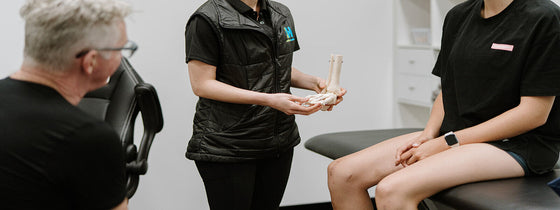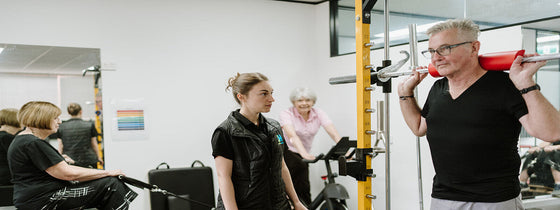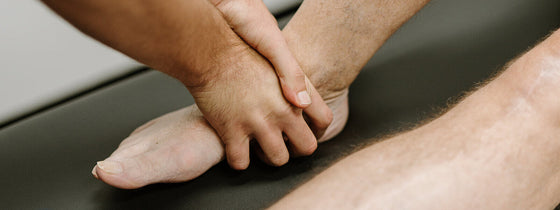Pedaling Toward Wellness
Bike riding is not just a leisurely activity; it's a therapeutic journey that physiotherapists love to embrace. In this blog, we explore the multifaceted benefits of bike riding, ranging from the innate love for movement that joints crave to its pivotal roles in pre-habilitation, rehabilitation, cardiovascular health, strength building, and as a social activity that fosters connections.
Pre-habilitation: Pedaling for Prevention
Preventive measures are at the core of physiotherapy, and bike riding emerges as a proactive approach to pre-habilitation (e.g. Hip and hip replacements ; ACL-Pre-habilitation). Engaging in regular cycling serves as a preventive strategy against musculoskeletal issues. It enhances cardiovascular fitness, strengthens muscles, and improves overall endurance. Physiotherapists advocate for bike riding as a means to condition the body, reducing the risk of injuries and laying a robust foundation for physical well-being.
Rehabilitation: Cycling Back to Health
Bike riding at times takes a front seat in the rehabilitation playbook. Following injuries, (e.g. acute and chronic knee pain, aching ankle) ankle or surgeries, the controlled, gentle weight-bearing nature of cycling provides a pathway to recovery. It aids in rebuilding strength, improving range of motion, and restoring joint function. Whether recovering from knee surgery or managing chronic conditions like arthritis, physiotherapists often prescribe tailored cycling routines to expedite rehabilitation while minimising the risk of re-injury.
Joints Love Movement: The Dynamic Dance of Mobility
Physiotherapists understand that joints thrive on movement, including those with OA. Bike riding provides a low-impact yet highly effective way to keep joints in motion. Bike pedalling engages lower limb joints, promoting range of motion and lubrication. As a weight-bearing exercise, cycling contributes to joint stability while minimizing the impact on weight-sensitive areas, making it an ideal choice for those aiming to maintain or improve joint health.
Strength Building: Pedaling for Power
Bike riding is a dynamic strength-building activity, with its capacity to engage major muscle groups, enhancing overall strength. The resistance applied during pedaling, especially when tackling inclines, provides an effective means of building leg muscles. This muscular engagement extends beyond the lower body, involving the core and upper body, creating a comprehensive strength-training experience that aligns with health principles.
Cardiovascular Fitness: Pumping Pedals for Heart Health
Cardiovascular health is paramount, and bike riding is a cardiovascular powerhouse. The sustained effort of pedalling elevates heart rate, promoting cardiovascular fitness and reduce the risk of cardiovascular diseases, and helps manage conditions like hypertension. The combination of aerobic exercise and the joy of cycling contributes to an overall cardiovascular workout that aligns with better well-being.
Social Activity: Riding Together for Well-being
Bike riding transcends the physical; it is a social activity that fosters connections. Group rides with friends and family or cycling clubs create a supportive community, providing a platform for individuals to share their wellness journey. The camaraderie built during group rides enhances motivation and contributes positively to mental, and physical, health.
The Mind-Body Connection: Cycling for Mental Well-being
Physiotherapists recognise the profound impact of physical activity on mental health. Bike riding, with its rhythmic cadence and the liberation of cruising through open spaces, offers a therapeutic escape. It reduces stress, alleviates anxiety, and contributes to an overall sense of well-being. Incorporating cycling into rehabilitation programs serves a dual purpose, addressing both the physical and mental aspects of recovery.
Riding the Wave of Physiotherapy
In the world of physiotherapy, bike riding is not merely a personal preference; it's a strategic choice grounded in the science of movement and rehabilitation. From nourishing joint health to playing pivotal roles in pre-habilitation, rehabilitation, cardiovascular health, strength building, and as a social activity that fosters connections, the bicycle emerges as a versatile tool in the physiotherapist's toolkit. As wheels turn and pedals spin, physiotherapists and their clients embark on a therapeutic joyride toward holistic well-being.
Ready to embark on your journey to improved health? Schedule a session with our expert physiotherapists and experience first-hand the transformative benefits of bike riding tailored to your unique rehabilitation needs. Take the first step towards a healthier, more active lifestyle – book your appointment now!

If you're experiencing back or neck pain with neurological signs and symptoms, a thorough neurological examination is crucial for accurate assessment and effective treatment. In this Optimal Tip learn more about what we mean by completing a neurological exam!

Squats, deadlifts, and calf raises are key movement patterns that should be part of every strength and conditioning program—regardless of age and activity level. These functional movements support joint health, improve posture and balance, and reduce the risk of injury while building strength where it matters most.

A ganglion cyst is a fluid-filled swelling that typically forms over a joint or tendon sheath, causing discomfort and pain, especially when pressing against nerves or joints. Proper assessment and treatment, including physiotherapy, are essential for managing symptoms and improving function in the presence of a ganglion in your hand, foot, or wrist.